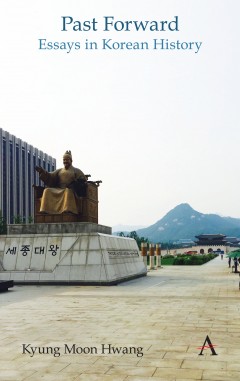Past Forward
Essays in Korean History
By Kyung Moon Hwang
PDF, 256 Pages
ISBN:9781783088805
January 2019
£16.99, $17.95
- About This Book
- Reviews
- Author Information
- Series
- Table of Contents
- Links
- Podcasts
About This Book
A wide-ranging collection of concise essays, ‘Past Forward’ introduces core features of Korean history that illuminate current issues and pressing concerns, including recent political upheavals, social developments and cultural shifts. Adapted from Kyung Moon Hwang’s regular columns in the ‘Korea Times’ of Seoul, the essays forward interpretative points concerning historical debates and controversies in order to generate thinking about the ongoing impact of the past on the present, and vice versa: how Korea’s present circumstances reflect and shape the evolving understanding of its past. In taking the reader on a compelling journey through history, ‘Past Forward’ paints a distinctive, fascinating portrait of Korea and Koreans both yesterday and today.
Containing both extensive chronological and subject tables of contents, the essays are grouped into themes demonstrating a particular facet of the recurring connections between the past and the present. In addition, the book contains a timeline of contents that situates the essays in chronological context and a subject index. While all the self-contained essays introduce particular facets of Korean history and society, they are free of jargon and written for the general reader.
Reviews
“Kyung Moon Hwang’s collection of essays is a delightful mix of contemporary commentary informed by a rigorous historical mindset. Particularly with Korean history, it is necessary to cut through politicized narratives facilely applied to everyday events and current political passions. Hwang does this in spades with penetrating historical insight leavened by humor. A wonderful read for those interested in Korea’s present and past.”
—Michael Robinson, Professor Emeritus, Korean History, Institute for Korean Studies, Indiana University, USA
“This collection of illuminating essays reveals how complex and ordinary historical events shape the story and meaning of the present. Written in a lively and entertaining style, Professor Hwang’s book is indispensable for anyone who wants to understand what is going on in the two Koreas today.”
—Sheila Miyoshi Jager, Author of Brothers at War: The Unending Conflict in Korea, and Professor of East Asian Studies, Oberlin College, USA
Author Information
Kyung Moon Hwang is professor of history and East Asian languages and cultures, University of Southern California, USA, where he teaches courses on Korean history, East Asian studies and world history. He is the author of 'A History of Korea—an Episodic Narrative' (2016), 'Rationalizing Korea: The Rise of the Modern State, 1894–1945' (2015) and 'Beyond Birth—Social Status in the Emergence of Modern Korea' (2004), and co-editor of 'Contentious Kwangju—the May Uprising in Korea’s Past and Present' (2003).
Series
Table of Contents
List of Figures; Foreword; Chronologies of Korean History; Themes; Acknowledgments; Note on Romanization and Spelling; Part I Circulating History; 1. Recycling Names for Korea; 2. Toppling Tyrants; 3. Religion and Secularism; 4. Commemorating the Comfort Women; 5. May 16 and May 18; 6. Tragedy and Farce; 7. Generational Renewal; Part II Durable Traditions; 8. Marking the New Year; 9. Slavery , Bondage, and Social Hierarchy; 10. Marriage, Adultery, and Concubinage; 11. Buddhism and Korean Identity; 12. Christianity ’s Rapid Rise; 13. Civil– Military Balance in Politics; 14. Regionalism in Elections; 15. Yeongnam’s Strong Presidential Politics; Part III Ancient Remains; 16. The Beginnings of Korean History; 17. Ancient and Present Gaya; 18. Empress Gi; 19. Speaking of Northern Korea , not North Korea; Part IV Dynastic Depths; 20. Currency and National Identity; 21. Concubine Descendants; 22. The Real Lives of Gisaeng Courtesans; 23. A Shocking Execution; Part V Modern Origins; 24. Jungin, Forerunners to Professionals; 25. 1894, a Signal Year; 26. Great Korean Empire; 27. March First Independence Movement; 28. The Politics of Disease; 29. Korean Universities; Part VI Challenges of Nationhood; 30. Korea’s Past in Light of Brexit; 31. Openness and Exclusion; 32. The North Korean View of History; 33. Another Way to View National Division; 34. The First National Assembly Elections; 35. Who Started the Korean War ?; 36. Textbooks and Competing Nationalist Histories; 37. The Complexities of Memorial Day; 38. Adoption’s Spotlight on Korean History; 39. Questioning Monuments; 40. Taking Ownership of the Past; Part VII History Makers; 41. Demythologizing King Sejong the Great; 42. Modern Lady Shin Saimdang; 43. Five Potential National Heroes; 44. A Portrait of Great Painters; 45. Four Young Men from 1884; 46. Na Hye- seok; 47. Hyundai Motors and Chung Ju- yung; 48. Yun Isang and the East Berlin Case; 49. Ri Young- hee , Iconoclast for Democracy; 50. Kim Young Sam’s Broad Historical Appeal; 51. Kim Dae Jung ’s Historic Election; Part VIII External Presences; 52. Korea’s Complicated Relationship with China; 53. How Chinese was Chinese History?; 54. Tiananmen and the Power of History; 55. Lotte between Korea and Japan; 56. Comfort Women Beholden to History; 57. A Modest Proposal for Dokdo; 58. The General Sherman Incident of 1866; 59. Depictions of the United States; 60. Overcoming Old Views of Korea– United States Ties; 61. Foreign Language Dependency; Part IX Trials of Modernization; 62. Summer Symmetries; 63. The Korean War as a Turning Point; 64. The Students of April; 65. The Four Ds of South Korean History; 66. Two Assassinations; 67. Roads to Revolution; 68. Dramatizations of the Gwangju Uprising; 69. The Great Labor Uprising of 1987; Part X Gripped by the Past; 70. Natural Disasters and the False Wisdom of the Past; 71. Royal Dangers; 72. North Korea ’s Alternative History; 73. Origins of Korea’s Political Corruption; 74. Anti- Communism’s Powerful Hold; 75. Fraudulent Captains of the Sewol Ferry Disaster; 76. Overcoming Past Hierarchies; 77. Gripped by the Authoritarian Mindset; 78. Ways of Living History; Index.
Links
Stay Updated
Information
Latest Tweets



